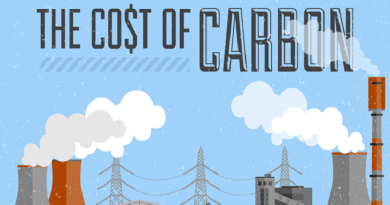Ocean climate action: Report lays 10 key messages for govts at COP27
Momentum is building for a strong political outcome relating to oceans at the UN Climate Change Conference COP27 in Sharm el-Sheikh, Egypt, in November, including greater ambition to cut greenhouse gas emissions, strengthened measures to build the resilience of coastal communities to climate change impacts and the financing needed for this.
Oceans cover around 70% of the surface of the planet, and people in coastal regions continue to be at the forefront of the fight against climate change and are disproportionately affected. At the same time, oceans have a vast potential to store carbon, and coastal waters are, for example, a prime location for renewable energy projects and ecosystem protection and restoration.
As a key outcome of an Ocean and Climate Change Dialogue held in June, the UN Climate Change Secretariat has published a new report highlighting the vital importance of the ocean for livelihoods and biodiversity and as a fundamental component of the climate system, underscoring the need for greater ocean-related climate action at COP27.
The report delves into the need for governments to promote clear and long-horizon policy frameworks to cut greenhouse gas emission, including through offshore renewable energy and emission reductions from shipping.
The Ocean and Climate Change Dialogue Report lays out 10 key messages for governments to consider in the lead up to COP27 which set out opportunities for greater ambition and action for ocean climate action at the national and international level. These key messages are:
We must protect our ocean AND value its potential as a place for sustainable climate solutions and action.
Ocean-based measures offer significant mitigation (cutting greenhouse gas emissions) and adaptation (building resilience to climate change) options.
The ocean offers a space for integrated solutions that can be reflected in national climate policies and strategies.
Marine technology and marine and coastal nature-based solutions should be integrated to ensure that action is more robust, comprehensive and cost-effective than when using either solution alone.
We must use, improve and integrate the latest available ocean science and other knowledge systems.
A whole of society approach is needed for ocean – climate action, including to address governance aspects.
Funding for ocean-climate action needs to increase and access to funding must be supported
Strengthened finance and other support, including capacity building, must embrace complexity to provide innovative and multidisciplinary solutions.
A framework for collaborative efforts across UN Processes would increase institutional support for ocean-climate action.
Future ocean and climate change dialogues should focus on distinct topics to deep-dive into specific solutions that strategically support and strengthen ocean-climate action at national and international level and under the UNFCCC process.
2022 has been named ‘the Super Year of the Ocean’, with a key number of breakthroughs on ocean-climate action: in March, the UN Environment Assembly agreed to begin negotiations for a binding global treaty to end plastic pollution, and at the UN-Ocean Conference in Lisbon in June, governments collectively agreed to scale up science-based and innovative actions to address the ocean emergency.
The Ocean and Climate Change Dialogue held in June was mandated by governments at last year’s UN Climate Change Conference COP26 in Glasgow. The Chair of the UNFCCC’s Subsidiary Body for Scientific and Technological Advice, Tosi Mpanu-Mpanu, described the dialogue as the start of a “new mandate and a new opportunity for strengthening ocean and climate change action under the UNFCCC”.
A clear message that emerged from the Ocean and Climate Change Dialogue is of the importance of ‘blueing the Paris Agreement’ – making the ocean a place for real climate innovation and action.
“We need to close the funding gap notably for adaptation to climate change in the context of oceans. Official recognition of the outcomes of the Oceans Dialogue is one clear next step in the UNFCCC process that can inform future funding, funding priorities and implementation plans for ocean climate action at the national and local level”, said Lisa Schindler Murray, of the UNFCCC Nairobi Work Programme Expert Group.
Recent work by the UNFCCC Technology Executive Committee (TEC), Nairobi work programme Expert Group on Oceans, The International Union for Conservation of Nature (IUCN), and Friends of Ecosystem-based Adaptation (FEBA) shows that integrated technology- and nature-based solutions offer the potential to be more robust, comprehensive, and cost-effective than either solution alone, and ocean-based measures offer significant options for resilience to climate change impacts and risks.
These solutions include early warning systems for extreme events and approaches such as restoration of coastal vegetation alongside engineered seawalls to reduce the impacts of storm surges and sea level rise.



